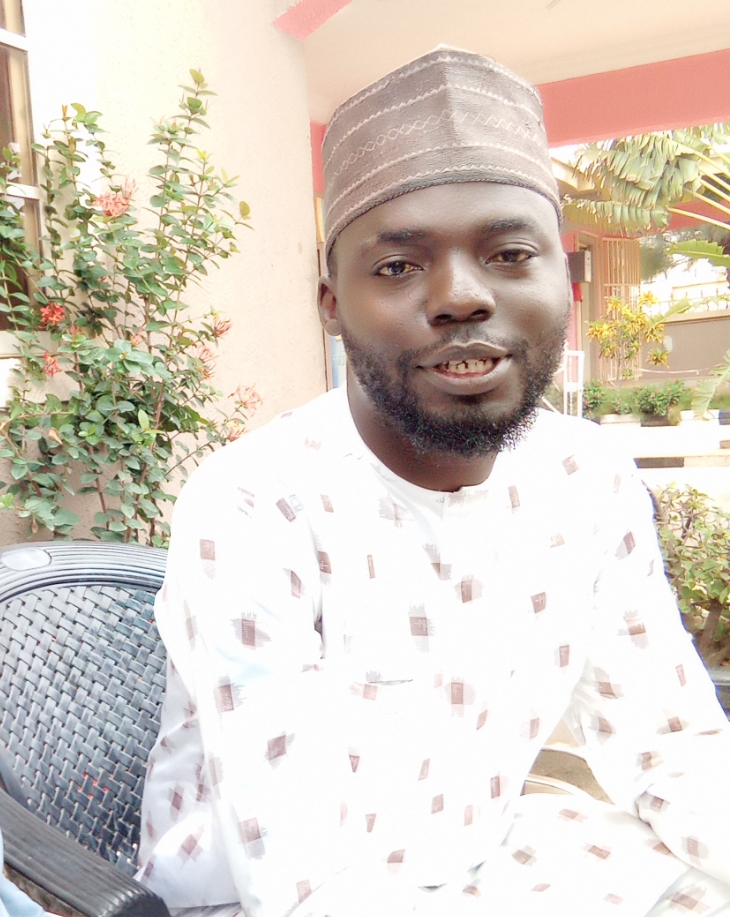Ismail Abubakar’s enchantment with the world of books traces its origins back two decades, back to his days in secondary school. His ardor for literature bestowed upon him a rather fitting moniker among his peers – ‘bookworm’. While his companions reveled in the delights of soccer matches and jovial camaraderie, Ismail’s heart lay within the pages of bound knowledge. The library was his domain, a realm he inhabited, a habit he lugged to his university years, molding the very fabric of his life. Always on the prowl for a tranquil sanctuary, a place to lose himself in the cadence of words.
As fate would have it, the Gombe National Library emerged, standing as a beacon of hope for Ismail’s pursuit of intellectual ascension. His elation was palpable, a culmination of dreams. A bastion of serenity and learning, the library seemed tailor-made for Ismail’s voracious curiosity and insatiable appetite for books.

Frequenting the library became a ritual for Ismail – a refuge for study, contemplation, and innovation. Yet, the path was not without its thorns. The library’s architecture stood commendable, its ambiance alluring, an oasis for deep thought. However, one crucial deficiency emerged as a relentless barrier for Ismail – the conspicuous absence of electricity. When the sun’s fervor was at its zenith, the library transformed into an inferno, Ismail’s thirst for knowledge wilting in the oppressive heat. He confided, “The mere thought of entering a library devoid of light saps my determination to even step foot in there. It’s a disheartening truth, a scourge on the reading culture I hold dear.”
Ismail’s tale is a mirror reflecting the stark reality, an ordeal shared by countless residents tethered to this affliction, curbing their desire to embrace the library’s offerings.

Indeed, the resplendent Gombe National Library, a monument of architectural grace, ensnares visitors with its majestic façade and picturesque allure. A conundrum arises – is it a mere sanctuary for literary consultation, or does it extend an invitation to unwind amidst its tranquil embrace, to meditate in the lap of its cozy atmosphere? Yet, the idyllic semblance shatters as swiftly as it materializes, a revelation unveiled by the diligent chroniclers at WikkiTimes.
Gombe Girls Who Lead Blind Men Cry Foul Over Exploitation, Harassment by Their Principals
Intriguingly, our reporter’s voyages into the repository of bound wisdom unearth a dismaying reality – the library’s barren of both electricity and water. A symphony of potential muted by the absence of vital resources, rendering the space uninhabitable for prolonged stretches.
This plight has endured, a persistent adversary to the library’s prosperity, deterring footfalls and repelling potential investors keen on leasing its vacant spaces.
Salisu Ibrahim, a brilliant Software Engineer, shared his vexation with WikkiTimes, his voice tinged with disappointment. His aspirations of orchestrating conferences within the library’s walls had been a cherished notion, a dream carried on the wings of ambition. Yet, the specter of absent electricity cast a somber shadow, rendering these aspirations nearly untenable.
He sighed, “We were planning to hold a Wikipedia program there next time, but on second thought, we realized that it’s not going to be possible without light,” he said.
Parallel to Salisu’s ordeal, the Library’s Chief Librarian and Branch Manager echoed his sentiments, a sympathetic symphony of dismay. Countless entreaties had been dispatched to the Gombe state government, imploring for the installation of power transformers and the flow of water. Yet, these endeavors remained ensnared in futility.
Abubakar Yahaya, with candor, relayed his grievances to WikkiTimes on a Wednesday, the bitterness in his words echoing the depths of his disappointment. The negligence of the state government weighed heavily on his heart, casting a pall over the fate of the National Library.
He divulged the repeated attempts at engagement He said time and again, he had knocked on the government’s door. Since he took on this role in Gombe back in 2015, the visits to the government’s chambers are countless, the pleas unending.
He continued, a tinge of helplessness evident, arguing, that other branches of National Libraries in various states bask in the attention of their governments. Vehicles are bestowed upon some, but Gombe’s destiny seems divergent.
Yahaya’s words resounded with a plaintive plea, detailing his fruitless endeavors to seek assistance. He stood before the gates of the government house on many an occasion, conferred with the deputy governor, and graced the Emir’s palace with his presence. Alas, silence echoed in response, he said. The letters requesting for assistance lie untouched, their contents unheeded.
He bemoaned the unfortunate scenario, explaining their effort to entice investors. Their quest to beckon potential partners, the National Information Technology Development Agency, NITDA, was extended numerous invitations. Even a missive reached Professor Isa Ali Pantami, the former minister of communications and digital economy—the result fruitless.
Defeat has cast its shadow, he sighed, recounting a disheartening episode. He once invited Isma’il Uba Misilli, the spokesperson for the current Governor, to witness the predicament firsthand. The governor’s media aide graced with his presence, but the winds of change failed to blow.
Yahaya’s frustrations were palpable, encapsulated in his words. He said in the past, water would grace the place intermittently. But with 30 toilets now standing, even the intermittent blessing falls short. For this space to thrive, light and water are non-negotiable.
A lamentation followed, poignant in its simplicity: No trace of the state government’s contribution remains. Not even the annual memento calendar graces the edifice.
A plea reverberated in his parting words, a yearning for amplification: “We seek to rouse the government’s consciousness. Perhaps, if the media lends its voice to our entreaties, our pleas will find a path to receptive ears.”
Additional reporting from Haruna Mohammed Salisu





Comment: without our reading culture, we are nothing but we call on the government to help us repair the water needed and the electricity please, the government should into this matter.